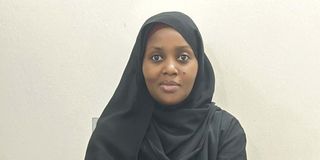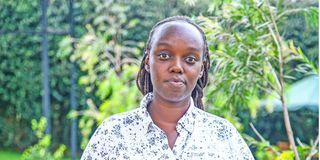Premium
Why I chose to have only one child

From left: Anita Wanjiru, Mariam Wanjiku and Faith Ndoti.
In many African cultures, having only one child was considered unusual, sometimes even frowned upon. A large family was seen as a symbol of stability, wealth, and legacy. But today, more parents are opting to have just one child, and their reasons are as diverse as their experiences.
Raising an only child comes with unique joys and challenges. There’s the undeniable bond between parent and child, the financial ease of focusing on one, and the ability to parent with more attention and intentionality. On the flip side, there are the constant questions from relatives, the societal whispers, and the lingering fears—what if something happens to them? Will they feel lonely? Will they be spoiled?
In this feature, three parents share why they chose to raise only one child. Their stories are raw and thought-provoking, challenging old narratives and embracing new perspectives on what family means.
Anita Wanjiru Mwaura, 24 - Business Lady in Nairobi

Anita Wanjiru is a business lady who chose to have 1 child since she doesn't want her children having different fathers.
I became a mother at 21, something I never saw coming. It was my first time having sex, so when I found out I was pregnant, I was in complete shock. At first, I laughed, thinking the test kit was faulty. But after multiple tests, reality hit me—I was going to be a mother.
When I told the father, he made it clear that he wasn’t ready for parenthood. I respected his decision, sought therapy, and made a commitment to raise my unborn child. I developed an unbreakable bond with my daughter, and when I finally held her in my arms, I knew—she would be my one and only.
I always imagined having a family with a husband and multiple children. I wanted all my children to share the same father, and when that didn’t work out, I chose to raise my daughter alone.
It has been an incredible journey. She is my little broke bestie—we do life together, and she inspires me to be the best version of myself. Financially, it has been a blessing because I can provide for her without struggling.
I don’t let societal or family expectations pressure me. I am the CEO of my own life. As for my daughter, who is now two, she hasn’t realised she’s an only child yet, thanks to her cousins who keep her company. As she grows, I will gradually explain my decision to her.
People often ask, “What if you lose her?” But I believe God is the author of life. Parenting one child has allowed me to grow as an individual, and I have no regrets.
Mariam Wanjiku Njoroge, Cleaner in the UAE

Mariam Wanjiku is a cleaner in the UAE.
As a single mother, I never saw it fit to have more children with different fathers. Pregnancy was not easy—I had a scare at seven months, and the thought of going through that stress again was overwhelming. The journey was long and tiring, and I didn’t want to risk another complicated experience.
One of the biggest advantages of raising one child is that I can give him all my attention. There’s no dividing my focus, no juggling between multiple children. But it also comes with challenges, like when he asks me when he’ll have a sibling, and I don’t have the right words to explain. I also find it hard to say no to him—he gets what he wants because, at times, it’s difficult to deny him things when he’s all I have.
Working far from home, I make sure we stay connected. We talk at least three times during the week and spend hours catching up on weekends. My brothers offer him love and support, so he never feels lonely.
I have no regrets about having one child, and I never will. It makes life easier—I can provide for him without struggling. People always have opinions. Some say I should have more children in case something happens to him, while others claim he’s too spoiled and needs a sibling. But I always tell them: “run your own race”.
I love being a mother, and I cherish the bond we share. He confides in me about school, his good and bad days, his wins and losses, and I support him every step of the way.
Faith Ndoti, Engagement Executive in Nairobi

Faith Ndoti is an engagement executive in Nairobi. She says raising one child allows her to pour all her love, time, and resources into one child.
I’m a parent to one amazing child. I’ve always wanted to have only one child, a decision shaped by personal experience and practical considerations.
The journey from conception to toddlerhood is intense—it demands your full presence. The first five years of a child’s life are so crucial, and I found myself pausing aspects of my career and personal growth to be fully present. I was raised apart from my sibling, and I didn’t enjoy that setup. There are many advantages to this choice. I can build a strong bond with my child, manage resources more efficiently, and avoid issues like sibling rivalry or future inheritance disputes. It's also more manageable financially, especially in today’s economy.
Of course, it comes with its challenges, especially when it comes to companionship. As a parent, I’ve had to become not just Mum but also a playmate and partner. To balance this, I work from home, which gives me the flexibility to be present. I plan playdates and sleepovers with cousins and friends so my child stays socially engaged.
People often assume that only children grow up lonely or spoiled. That’s a misconception. With intentional parenting, strong values, and a focus on discipline and empathy, an only child can thrive just as well, if not better.
Joy Maele, a counselling psychologist at the Retreat Rehabilitation Centre, explains that for many only children, the experience of growing up without siblings has a deep psychological footprint into their adulthood that may influence even the way they choose to parent.

Retreat Rehabilitation Centre Head of Clinical Department, Psychologist Joy Maele, during an interview at the Centre in Ngong on April 29, 2025.
"There will be a strong bond between you and your parents, a very close relationship, because you spend most of the time together and you don’t have other sibling distractions,” she says.
Consequently, growing up without siblings can fast-track emotional development. "Sometimes it pushes you to mature early, you start talking like an adult, because adults are the only people you are surrounded with. The child tends to be good even when relating to authority figures like teachers or bosses."
But, this early maturity the psychologist says comes hand-in-hand with the burden of expectations. "All the hopes, dreams and anxieties are put on you, and then now as a child you start having this internal pressure to be perfect, to be successful to make your parents proud."
That independence fostered on only child, she claims, often leads them to develop a sense of self-sufficiency that spills into adulthood. "It gets to a point whether the other partner is there or not, you’re just okay, because you learned how to enjoy your own company.
In many cases, the psychologist explains that the decision to have one child may stem from the trauma of broken marriages. "If you’re in a broken marriage and you have more than just one child, there is the burden of providing for the children, but when you have one child then you think at least this is enough — me and my child will be able to handle."
Joy encourages parents to "prioritise social opportunity. Give your child plenty of chances to interact with other children, whether it’s cousins, neighbours or classmates, let it not just be you and the child."
Additionally, respecting your child's need for solitude is important. "They will enjoy quiet time and independence, so respect that need and also create healthy boundaries," she says.
Can it affect the child’s adult choices?
“When you grow up the loneliness makes you either afraid to have people in your life because you’re not used to it and you don’t know how to react to it, so you’d find either when you grow up you don’t want to have children at all because your parents are never there, or you’d also just want that one child because that’s what you’re used to, that’s what you know."
Additionally, the psychologist says, "Most parents make decisions for their children without empathising and putting themselves in the child’s shoes. Most of the time, parents only think of themselves. This shouldn’t be the case.”


